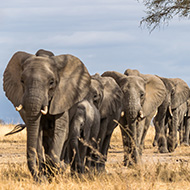Study highlights true value of elephants

“Whether it’s economic, ecological, or social, a blanket approach to values can impact the success of a conservation strategy" - Dr Lucy Bates, University of Portsmouth.
The values and benefits of elephants are often overlooked when deciding how to protect them, a new study has found.
Writing in the journal Ecosystems Services, researchers argue that conservation strategies frequently have a narrow focus and often prioritise certain values of nature, such as economic or ecological, over moral ones.
Specifically with regards to elephants, the study found that financial benefits generated by ecotourism, trophy hunting and the ivory trade conflict with the animal's ecological, cultural and spritual contributions.
Researchers stress that not fully understanding or considering the value systems of all stakeholders involved in conservation, including local people, leads to social inequality, conflict and unsustainable strategies.
Study co-author Antoinette van de Water, from the University of KwaZulu-Natal in South Africa, explained: “We chose to look at elephants as the case study because their conservation can be especially challenging and contentious.
“We’re not saying economic contributions aren’t important, but there’s a lot of different values at play and they all need to be considered in conservation strategies if they are going to succeed.”
The study also shows that, when making decisions about conservation, decision-makers frequently adopt a single viewpoint.
Co-author Dr Lucy Bates, from the University of Portsmouth, said: “Whether it’s economic, ecological, or social, a blanket approach to values can impact the success of a conservation strategy.
“Consider something like the ivory trade for example. International trade in ivory is illegal, but many southern African countries want to restart the trade leading to contention across the African continent. If you focus less on the potential economic value of ivory, and turn to other ways elephants can support communities, it can be a game-changer.
“On a smaller scale, you can also apply this framework to defining protected areas and what land could be made available to elephants. By listening to those living in these areas, you can get a clear understanding of how decisions will affect human life as well, and work out ways to resolve any issues.”
The study, The value of elephants: A pluralist approach, is a collaboration between universities in England and South Africa, including the University of Portsmouth.



 The Veterinary Medicines Directorate (VMD) is inviting applications from veterinary students to attend a one-week extramural studies (EMS) placement in July 2026.
The Veterinary Medicines Directorate (VMD) is inviting applications from veterinary students to attend a one-week extramural studies (EMS) placement in July 2026.